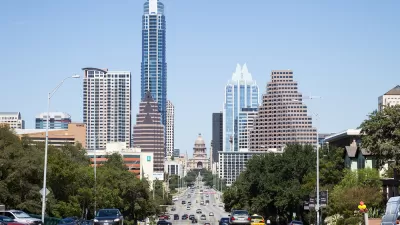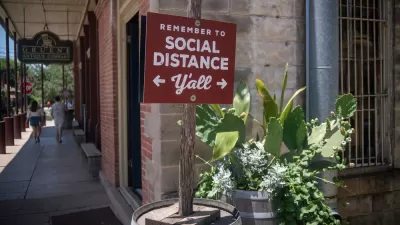The city of Austin's political leadership has proposed a package of competing bond proposals to raise money for large congestion relief measures in the fast-growing city.

An editorial by Alberta Philips explores some of the rhetoric behind a recent $720 billion bond proposal for the city of Austin, championed by Mayor Steve Adler. The editorial mostly digs into the scope of the bond, proposed to overhaul "key traffic corridors" in and around the city.
When he announced the $720 million bond package at the end of May, according to Philips, Mayor Adler claimed it was "time to 'go big or go home.'" The bond backs up that big talk by providing funding for the so-called Smart Corridor initiative. Philips also identifies a proposal by State Senator Kirk Watson to overhaul Interstate 35 as another example of the big thinking that presents "a remarkable opportunity to do something about their transportation predicament."
Philips's argument holds off on defining how the city should build bigger to solve Austin's congestion woes—first arguing that competing bond proposals by Austin city councilmembers are "too small to get the job done." One proposal, supported by City Councilmember Ann Kitchen and the city's mobility committee, would raise $300 million. City Councilmember Greg Casar backs another bond proposal that would spend $720 million, but has a "too small geographical reach and vision," according to Philips.
Only at the end of the editorial does Philips lay out the vision of what building bigger should look like, revealing a multi-modal, technology-enabled streetscape.
FULL STORY: Mayor says go big on transportation, but colleagues go small

Maui's Vacation Rental Debate Turns Ugly
Verbal attacks, misinformation campaigns and fistfights plague a high-stakes debate to convert thousands of vacation rentals into long-term housing.

Planetizen Federal Action Tracker
A weekly monitor of how Trump’s orders and actions are impacting planners and planning in America.

In Urban Planning, AI Prompting Could be the New Design Thinking
Creativity has long been key to great urban design. What if we see AI as our new creative partner?

San Francisco Mayor Backtracks on Homelessness Goal
Mayor Dan Lurie ran on a promise to build 1,500 additional shelter beds in the city, complete with supportive services. Now, his office says they are “shifting strategy” to focus on prevention and mental health treatment.

How Trump's HUD Budget Proposal Would Harm Homelessness Response
Experts say the change to the HUD budget would make it more difficult to identify people who are homeless and connect them with services, and to prevent homelessness.

The Vast Potential of the Right-of-Way
One writer argues that the space between two building faces is the most important element of the built environment.
Urban Design for Planners 1: Software Tools
This six-course series explores essential urban design concepts using open source software and equips planners with the tools they need to participate fully in the urban design process.
Planning for Universal Design
Learn the tools for implementing Universal Design in planning regulations.
Gallatin County Department of Planning & Community Development
Heyer Gruel & Associates PA
JM Goldson LLC
Mpact (founded as Rail~Volution)
City of Camden Redevelopment Agency
City of Astoria
Jefferson Parish Government
Camden Redevelopment Agency
City of Claremont




























